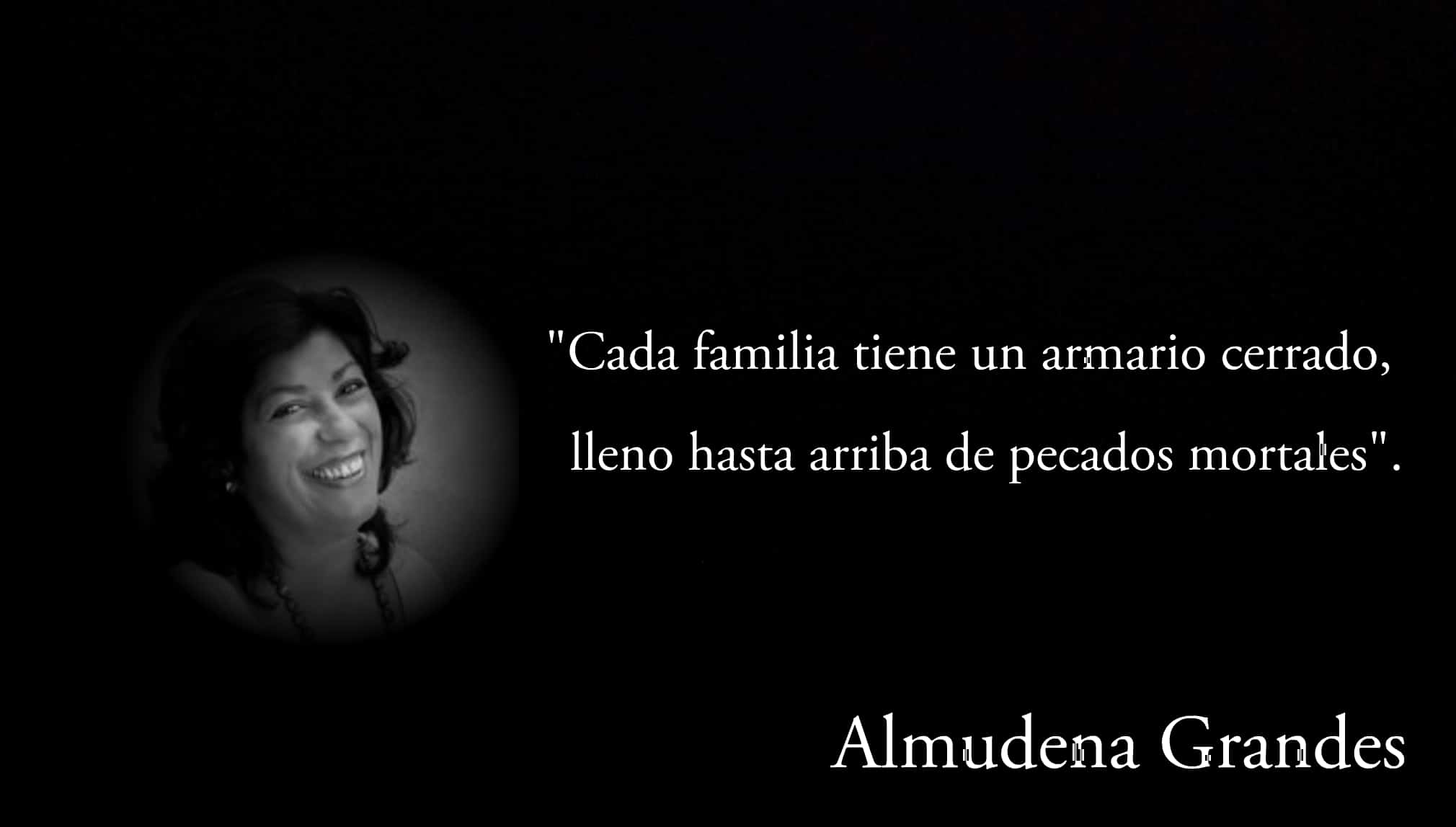
Quote by the writer Almudena Grandes.
Almudena Grandes (1960 – 2021) was, without a doubt, one of the most outstanding women in Spanish literature of the last three decades. Much of her notoriety came from her hand with a somewhat thorny issue in her country: historical memory. In this sense, Kisses on bread (2015), a novel whose setting is quite faithful to the harsh post-war era, is no exception.
This circumstance includes issues such as child hunger, a precarious public health system, bank fraud and patronage. For it, the writer and journalist from Madrid created a set of tenacious characters -women, mainly- Most of them belong to the middle and popular classes.. That is, the bulk of the population that suffered the most from the ills of the dictatorship.
Summary of The Kisses in the Bread
Home
Almudena Grandes welcomes her readers with a brief preface devoted to a detailed description of the city in which the events occurred. It is a place inhabited by elderly people who were born and lived there all their lives. These elders witnessed a bloody civil war and the migration to the capital of compatriots fleeing the misery of the interior.
Through a first-person narrator, the author describes the day-to-day life of the people of Madrid, their occupations, their desires and their family life. In parallel, the depth of the characters allows generating empathy in the reader due to the construction of very human profiles. To tell the truth, they were people with fears, joys, hopes and disappointments in the midst of a very difficult context.
The permanent anxiety
In the first chapters, families appear forced to leave their homes due to the impossibility of paying off their mortgages. Equally, many people became unemployed and, those who ran with some luck, barely survived the government subsidy. To make matters worse, a good number of generational businesses went bankrupt due to an economy in free fall.
Even so, there were citizens reluctant to accept their situation, anchored to a prosperous past, which made their new reality more indigestible. Subsequently, the dissociation of these people was not only on a personal level, on the collective plane they also distanced themselves from their friends. In those moments of extreme need, the survival instinct prevailed over any collective interest.
The protagonists
The main characters of the book understood that the longed-for bonanza of days gone by would not return. Consequently, readjusting to the present was key to overcoming adversity and giving room for hope. Thus, a spirit of perseverance, dignity, and integrity emerged in those who decided to abandon the role of oppressed victims and seize their future.
Eventually, the members of the soap opera crossed paths, either due to family ties, friendship, work, or because they lived in the same neighborhood for a long time. Certainly, most of them faced a thorny daily life —desperate in several cases— and pathetic, in a kind of nightmare eternal without exit.
The financial crisis spared no one
The decrease in income affected even workers with professional training (doctors, lawyers, accountants...), austerity prevailed in all family budgets. In the same way, vacations lost their allure and routine became a practical way of getting on… for a few months. Fear soon set in in the form of closed companies and mass layoffs.
Businesses that did not close were forced to reduce the number of employees in order to stay operational. The inevitable consequence was the increase in evicted people and school dropouts (many children and adolescents began to work). Similarly, progressively more school-age infants who attended classes without eating were observed.
The after
The last section of Kisses on bread is dedicated to honoring the bravery of those who managed to face each challenge in the best possible way. A year passes between the beginning and the end of the book.. On the one hand, workers who lived in endless uncertainty, without job stability, returned from vacation.
Others did not even have a job and had to wait in long lines to get a position or government aid. Nevertheless, there were a few that —as opposed to those lacking in faith and/or persistence— they did get some peace of mind, and even improve your circumstance. Here is a snippet from the end of the novel:
“Here we say goodbye to you, in this neighborhood of Madrid that is yours, different but similar to many other neighborhoods in this or any other city in Spain, with its wide streets and its narrow streets, its good houses and its worse houses, its squares , its trees, its alleys, its heroes, its saints, and its crisis in tow”.
Kisses on bread.
About the author, Almudena Grandes

Almudena Grandes
Born on May 7, 1960, María Almudena Grandes Hernández kept a very close bond throughout her life with her hometown, Madrid. Over there, She graduated in geography from the Complutense University and did her first jobs as a commissioned editor for publishing houses.. In addition to literature, he had an extensive journalistic career as a columnist for the newspaper El País.
Starting in the 1980s, Almudena Grandes ventured into the world of cinema working as a screenwriter and, occasionally, as an actress. In 1994, the Iberian writer married the poet and literary critic Luis García Montero. The couple had three children and remained together until her death, which occurred on November 27, 2021 (colon cancer).
Literary race
In 1989, Almudena Grandes published The ages of Lulu, winner of the XI La Sonrisa Vertical award for erotic narrative. Certainly, it was a brilliant literary debut, because, To date it has been translated into more than 20 languages and has sold more than a million copies.. In addition, the title was made into a film in 1990 under the direction of Bigas Luna (with Francesca Neri and Francesca in the leading role).
Moreover, The ages of Lulu was considered by El Mundo of Spain as one of the 100 best novels in Spanish of the XNUMXth century. Later, Over the years, the writer from Madrid knew how to live up to the bar that she herself set with her debut feature. In fact, many of his subsequent releases were award-winning.
The books of Almudena Grandes
- The ages of Lulu (1989);
- I'll call you friday (1991);
- Malena is a tango name (1994);
- Women models (1996);
- Atlas of human geography (1998);
- Rough Winds (2002);
- Cardboard castles (2004);
- Way stations (2005);
- The frozen heart (2007);
- Agnes and joy (2010);
- The Jules Verne Reader (2012);
- Goodbye, Martinez! (2014);
- Manolita's three weddings (2014);
- Kisses on bread (2015);
- Dr. García's patients (2017);
- Frankenstein's mother (2020);
- Everything is going to get better (2022)
